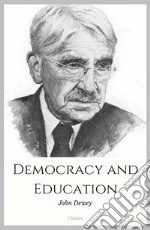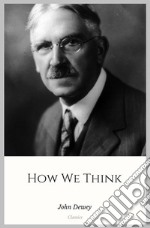The John Dewey Collection. E-book. Formato Mobipocket - 9788832534108
di John Dewey
edito da BLACKMORE DENNETT , 2019
Formato: Mobipocket - Protezione: nessuna
John Dewey was an American philosopher, psychologist, democratic socialist, and educational reformer whose ideas have been influential in education and social reform. Dewey is one of the primary figures associated with the philosophy of pragmatism and is considered one of the fathers of functional psychology. A Review of General Psychology survey, published in 2002, ranked Dewey as the 93rd most cited psychologist of the 20th century. A well-known public intellectual, he was also a major voice of progressive education and liberalism. Although Dewey is known best for his publications about education, he also wrote about many other topics, including epistemology, metaphysics, aesthetics, art, logic, social theory, and ethics. He was a major educational reformer for the 20th century.
The overriding theme of Dewey's works was his profound belief in democracy, be it in politics, education, or communication and journalism. As Dewey himself stated in 1888, while still at the University of Michigan, "Democracy and the one, ultimate, ethical ideal of humanity are to my mind synonymous."
Known for his advocacy of democracy, Dewey considered two fundamental elements—schools and civil society—to be major topics needing attention and reconstruction to encourage experimental intelligence and plurality. Dewey asserted that complete democracy was to be obtained not just by extending voting rights but also by ensuring that there exists a fully formed public opinion, accomplished by communication among citizens, experts, and politicians, with the latter being accountable for the policies they adopt.
The John Dewey Collection features:
Democracy and Education
The Child and the Curriculum
The School and Society
Schools Of To-morrow
The Schools of Utopia
Moral Principles in Education
Interest and Effort in Education
Health and Sex in Higher Education
My Pedagogic Creed
German Philosophy and Politics
Leibniz’s New Essays Concerning the Human Understanding:
Studies in Logical Theory
Interpretation of Savage Mind
Ethics
The Problem of Values
Soul and Body
Logical Conditions of a Scientific Treatment of Morality
The Evolutionary Method As Applied To Morality: Its Scientific Necessity & Its Significance for Conduct
The Influence of Darwin on Philosophy
Nature and Its Good: A conversation
Intelligence and Morals
The Experimental Theory of Knowledge
The Intellectualist Criterion for Truth
A Short Catechism Concerning Truth
Beliefs and Existences
The Postulate of Immediate Empiricism
“Consciousness” and Experience
The Significance of the Problem of Knowledge
Essays in Experimental Logic
Reconstruction in Philosophy
Does Reality Possess Practical Character?
Psychology and Social Practice
Psychological Doctrine and Philosophical Teaching
Psychology as Philosophic Method
How We Think
The Reflex Arc Concept in Psychology
The Psychology of Effort
Creative Intelligence
The Ego as Cause
The Terms ‘Conscious’ and ‘Consciousness’
On Some Current Conceptions of the term ‘Self’
The Psychological Standpoint
The Theory of Emotion: Emotional Attitudes & the Significance of Emotions
Human Nature and Conduct: An Introduction to Social Psychology
and
On Politics
The overriding theme of Dewey's works was his profound belief in democracy, be it in politics, education, or communication and journalism. As Dewey himself stated in 1888, while still at the University of Michigan, "Democracy and the one, ultimate, ethical ideal of humanity are to my mind synonymous."
Known for his advocacy of democracy, Dewey considered two fundamental elements—schools and civil society—to be major topics needing attention and reconstruction to encourage experimental intelligence and plurality. Dewey asserted that complete democracy was to be obtained not just by extending voting rights but also by ensuring that there exists a fully formed public opinion, accomplished by communication among citizens, experts, and politicians, with the latter being accountable for the policies they adopt.
The John Dewey Collection features:
Democracy and Education
The Child and the Curriculum
The School and Society
Schools Of To-morrow
The Schools of Utopia
Moral Principles in Education
Interest and Effort in Education
Health and Sex in Higher Education
My Pedagogic Creed
German Philosophy and Politics
Leibniz’s New Essays Concerning the Human Understanding:
Studies in Logical Theory
Interpretation of Savage Mind
Ethics
The Problem of Values
Soul and Body
Logical Conditions of a Scientific Treatment of Morality
The Evolutionary Method As Applied To Morality: Its Scientific Necessity & Its Significance for Conduct
The Influence of Darwin on Philosophy
Nature and Its Good: A conversation
Intelligence and Morals
The Experimental Theory of Knowledge
The Intellectualist Criterion for Truth
A Short Catechism Concerning Truth
Beliefs and Existences
The Postulate of Immediate Empiricism
“Consciousness” and Experience
The Significance of the Problem of Knowledge
Essays in Experimental Logic
Reconstruction in Philosophy
Does Reality Possess Practical Character?
Psychology and Social Practice
Psychological Doctrine and Philosophical Teaching
Psychology as Philosophic Method
How We Think
The Reflex Arc Concept in Psychology
The Psychology of Effort
Creative Intelligence
The Ego as Cause
The Terms ‘Conscious’ and ‘Consciousness’
On Some Current Conceptions of the term ‘Self’
The Psychological Standpoint
The Theory of Emotion: Emotional Attitudes & the Significance of Emotions
Human Nature and Conduct: An Introduction to Social Psychology
and
On Politics
Ean
9788832534108
Titolo
The John Dewey Collection. E-book. Formato Mobipocket
Autore
Editore
Data Pubblicazione
2019
Formato
Mobipocket
Protezione
nessuna
Punti Accumulabili






![Creative Intelligence [Halls of Wisdom]. E-book. Formato EPUB ebook](https://cdn.unilibro.it/cover/ebook/9781508098522g.jpg)